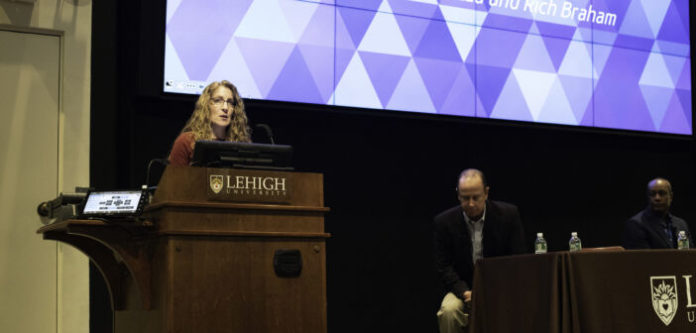
The Interfraternity Council hosted a webinar about the Anti-Hazing Coalition, a group created by mothers whose children died from hazing, on March 1.
Rae Ann Gruver, the mother of Max Gruver from Louisiana State University and Evelyn and Jim Piazza, the parents of Tim Piazza from Penn State, spoke about losing their sons to new members, chapter presidents, recruitment chairs, new member educators and athletes.
The mothers began by telling the audience details of their son’s deaths, letting them know who they were as people and the impact they had on others.
Tim Piazza passed away after a fraternity hazing event where he was forced to consume at least 18 drinks in less than two hours and suffered fatal injuries after a fall at Penn State in 2017. Since then, his parents have been leaders in the fight against hazing, passing a bill to strengthen Pennsylvania’s hazing laws. They also started the Timothy J. Piazza Memorial Foundation, whose mission is to raise money to provide prosthetics to children who need them, which is what Piazza wanted to do post-graduation.
Max Gruver passed away just weeks into his college career at LSU after being forced to drink 190-proof alcohol at a fraternity hazing event. His family started the Max Gruver Foundation and has been working to strengthen hazing laws in Louisiana since Max passed in 2017.
After sharing their personal stories, both Gruver and Piazza educated the audience about the consequences of hazing from legal, academic and social standpoints, and provided information on how to report hazing. They gave updated information about hazing deaths, with the most recent death being on Feb. 27 at Virginia Commonwealth University.
“I hope to empower young adults to step in and not be a bystander in these hazing situations,” Gruver said. “I hope to empower young adults to call 911 when they notice a situation has gone bad. Save a life.”
Jim and Evelyn Piazza said they have given the presentation to clubs and organizations at universities nationwide, both in person and virtually. They said they hope the main takeaway of the presentation is that students will feel comfortable calling for help in any situation necessary.
“A lot of people are worried about the repercussions of calling, wondering ‘will I have to go to a conduct hearing at school,’ but that is so small in comparison to saving a life,” Evelyn Piazza said.
The presentation ended with a call to action for students to make a change in their own organizations, to report hazing when they see it and to call for help when someone needs it.
After the presentation, Piazza and Gruver answered questions from attendees. Some topics covered were symptoms of alcohol poisoning, how to report hazing, how to support someone who may be a victim of hazing and the legal consequences of hazing.
Attendees were given resources for what to do if they find themselves in a similar situation at Lehigh, including information about medical amnesty. The Piazza family further urged students to be familiar with the information, and to err on the side of caution when dealing with an emergency.
“Almost everybody could have been saved, if only somebody would have called for help,” Evelyn Piazza said.
Carina Kelly, ‘24, said she found the personal aspects of the presentation impactful, and as a new member of Greek life, it was important to hear what may be going on around her.
“I think the overarching points of the presentation should probably be considered more in how Greek life culture works,” Kelly said. “We need to be kind, considerate, and smart.”
Peter Jensen, IFC President, was instrumental in planning the webinar and said he thought the community would find the presentation impactful. Up to a thousand people could have attended via Zoom, he said.
“It’s not just a webinar that tells you ‘hazing is bad,’ it shows the actual effects that this has had on real people and their families,” Jensen said.



















